Finance for Small and Medium-Sized Enterprises - DTI Home Page
Finance for Small and Medium-Sized Enterprises - DTI Home Page
Finance for Small and Medium-Sized Enterprises - DTI Home Page
Create successful ePaper yourself
Turn your PDF publications into a flip-book with our unique Google optimized e-Paper software.
<strong>Finance</strong> <strong>for</strong> <strong>Small</strong> <strong>and</strong> <strong>Medium</strong>-<strong>Sized</strong> <strong>Enterprises</strong>: A Report on the 2004 UK Survey of SME <strong>Finance</strong>s<br />
• SME banking is highly concentrated in a few banks - the largest four banks<br />
account <strong>for</strong> 80% of the market <strong>for</strong> current accounts <strong>and</strong> overdrafts.<br />
• And the propensity to switch banks is low - each year, 2.5% of SMEs switch<br />
banks.<br />
The reasons <strong>for</strong> the lack of switching are likely to be complex, involving factors<br />
on<br />
both the dem<strong>and</strong>- <strong>and</strong> supply-sides. The data do not allow us to look at supply side<br />
causes of inertia directly, although<br />
we find that a large minority (29%) of businesses<br />
would consider switching if approached<br />
by another bank (the implication being that<br />
rival<br />
banks do not attempt to poach customers). On the dem<strong>and</strong>-side, it is often<br />
argued that businesses do not switch banks because it would harm their access to<br />
finance, or because the process of switching is difficult. However, in this regard, the<br />
survey finds that:<br />
• Switching does not increase the chances<br />
of rejection. • Nor does it increase the cost of borrowing.<br />
• And most businesses, which have<br />
switched, report that the process was<br />
easy.<br />
On the other h<strong>and</strong>, switching is influenced by firm characteristics. Notably:<br />
• Businesses with qualified financial managers are more likely to switch than<br />
those without.<br />
• High growth businesses<br />
are 3 times more likely to have switched than slow<br />
growing businesses.<br />
This suggests<br />
that a lack of financial acumen <strong>and</strong> dynamism may be the true (dem<strong>and</strong>-<br />
side) causes of inertia, rather than the perceived<br />
benefits of established banking relationships. The tendency<br />
<strong>for</strong> most firms not to shop-around <strong>for</strong> alternative<br />
financial<br />
deals may pose few problems with low interest rates <strong>and</strong> available finance.<br />
In a harsher environment, however, the capacity to search <strong>for</strong> the best, or any, deal<br />
may be crucial. In this regard, financially skilled businesses, once again, have the<br />
edge over their competitors.<br />
On a more promising note <strong>for</strong> competition, there is evidence that new entrants,<br />
offering distance banking, could attract market share among larger SMEs. These<br />
businesses tend to use telephone or internet banking over visiting a local branch. Also<br />
analysis of the relationships between finances shows that traditional bank debt faces<br />
potential competition from asset- <strong>and</strong> equity finance.<br />
In conclusion, the analysis in this report supports some previously held views on SME<br />
finances, whilst also offering some new insights. However, this report is only the first<br />
stage in analyzing the wealth of data which have been collected. In the future, it is<br />
hoped that further analysis will facilitate deeper insights into SME finances.<br />
125


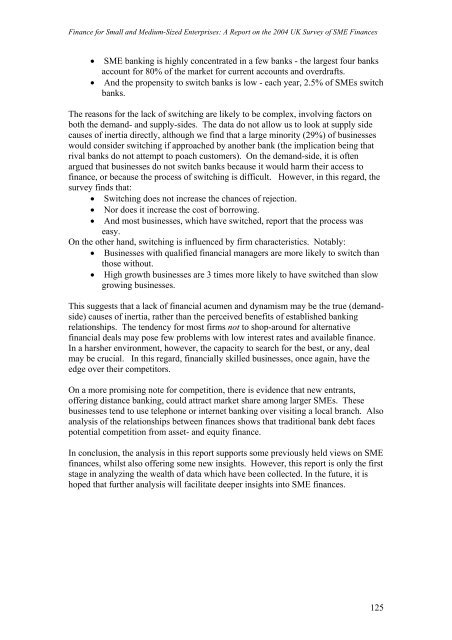
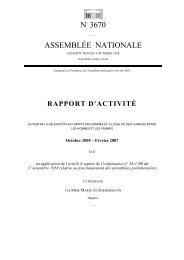
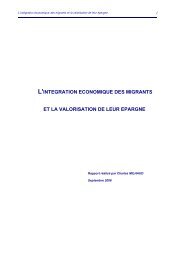

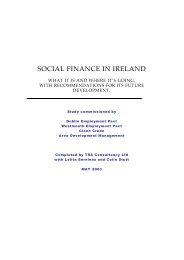

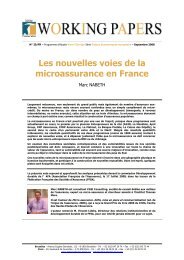

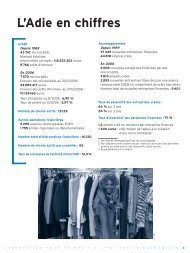
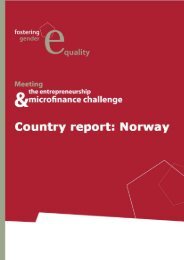


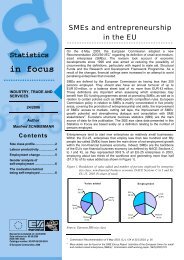
![Joint Report on Social Protection and Social Inclusion [2005]](https://img.yumpu.com/19580638/1/190x132/joint-report-on-social-protection-and-social-inclusion-2005.jpg?quality=85)
